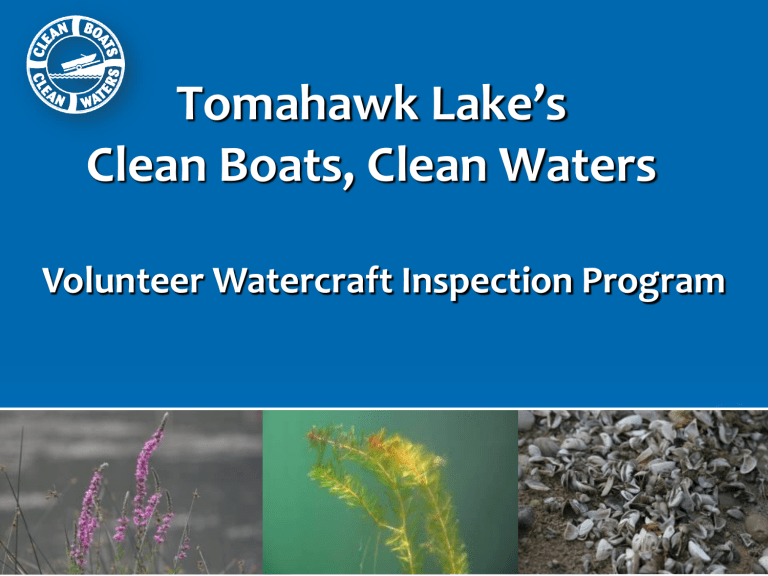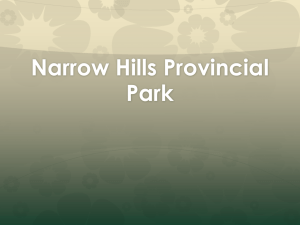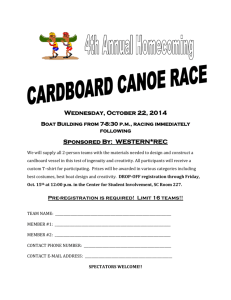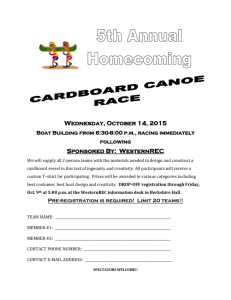Aquatic Invasive Species, Rivers, and You

Tomahawk Lake’s
Clean Boats, Clean Waters
Volunteer Watercraft Inspection Program
Thank You For Volunteering!
Everyone who lives on or uses Tomahawk
Lake during the summer for recreation and family gatherings appreciate what a wonderful place this is. By volunteering for
Tomahawk’s Clean Boat Clean Waters program, you have put your desire to be a good steward into action for the benefit of everyone who uses our lake. Thank you so much for your willingness to serve!
DID YOU KNOW:
Within a 50 mile radius of Tomahawk Lake there are 12 Aquatic Invasive Species other than Eurasian Water Milfoil that can be brought to our lake through our boat ramps!
You are our one and only line of defense in keeping them out!
What follows is an in-home training presentation for our Clean Boats Clean Waters program. I suggest that you first look through this slide presentation for a broad overview of what CBCW does, and than go back and understand what each slide is presenting.
Please understand that CBCW ramp attendants are not expected to know all of the answers, only to be willing to meet and talk with boaters at our ramps.
Our training program is designed to give you the basics of what to expect and how to talk with folks about the Aquatic Invasive Species threat.
Welcome to the Challenge!
What you really need to know about AIS…
Volunteers DO make a difference!
Why watercraft inspection?
The Law Concerning Transporting
Aquatic Plants
While it would be great if you were an expert on aquatic plant identification, the truth is it isn’t necessary, because the Law says that it is unlawful to transport
ANY AQUATIC PLANT MATERIAL
On Any Boat, Motor or Trailer
Over a Wisconsin roadway!
Getting Started: Volunteer Duties
Inform and educate boaters
Perform watercraft inspections
Collect and report watercraft data
Materials Needed
CBCW T-shirt and/or Hat
Clipboard & pencil
Watercraft Inspection form
Cell phone & local contacts
Lake Infestation Map
Four “Rules of the Road Handout
Boat Landing Message
Discuss prevention steps:
Inspect and remove all aquatic plants and animals.
Drain all water from boats and equipment before leaving the ramp.
Ice your catch before leaving ramp.
Dispose of live bait in ramp trash before leaving.
(see back of free lake map handout)
Starting the Conversation
CBCW Ramp Attendants are there to prevent Aquatic
Invasive Species (AIS) from entering and from leaving
Tomahawk Lake.
The most effective way to accomplish this is to enlist the boaters help in protecting Tomahawk Lake, where they enjoy such a quality experience.
The 2014 CBCW Survey Form
The CBCW survey form asks just a few questions which help the ramp attendant & the boater begin a quick conversation about AIS.
In the two or three minutes it takes to ask these questions the ramp attendant is in essence giving boaters a quick education on what they need to know to stay legal & help stop the spread of AIS.
Here’s the Form
First Things First!
Get ready for your work by filling out the top of the watercraft inspection report with:
1.
2.
Your name
Work date, start time, end time and hours spent working. Be sure to check if you are paid staff, or if your are a volunteer.
3.
Also note the landing location you are working at.
On to the boater conversations:
On the left side of the form, on the first two lines available for recording a boats information, check whether the boat is entering the lake or leaving the lake.
Count the total number of people who are in the boater’s group and enter that number on the column just to the right of the large box outlining the discussion steps.
Now for the
Questions & Answers
1. Have you been contacted by a CBCW watercraft inspector this season?
Just check the appropriate box: Yes or No
2. Are you willing to answer a few questions?
Again, just check yes or no. If they are not willing, thank them and just step away.
The Questions & Answers
3 Was the boat used during the past 5 days on a different water body? Check Yes or No
If they say yes, have them tell you the water body’s name(s) and location(s) Note them in the comments section at the bottom of the sheet.
Share the following information with the boater, as needed!
If your boats bilge has water in it, drain it before leaving the ramp because many aquatic invasive Species begin life as microscopic organisms and travel from lake to lake in boat and motor water.
If they are fishing share the following:
This also includes draining water from containers holding your catch & live bait in your boat. You should Ice your catch and drain your live well before leaving.
A word about minnows and leaches
It is unlawful to move minnows or leaches from one water body to another. This includes in boats live bait wells, and floating minnow buckets. The point is to not infect one lake with bait and bait water from another lake.
The law says that you must dispose of minnows and leaches, and drain bait water before leaving a ramp. Please be warned, Law enforcement will ticket offenders!
The final section on the form asks for your opinion about the boater. Simply check your confidence level that the boater understands the steps necessary to prevent the spread of
AIS.
The final steps in filling out the survey form are noting the number of people in each boat, and than totaling each column at the bottom of the sheet (very important).
That’s all there is to the survey.
Now it’s time to do a quick boat inspection, which is complimentary
Do a complete boat walk around, looking for any plant material on the hull, motor and trailer. Be sure to look underneath the boat, and where the boat hull sits on the trailer bunks. Look at the motor’s propeller area as well.
If You Find Something…
This is a teachable moment! Bring the material to the boat owners attention, and tell him to be very careful to remove any plant fragments from his boat each and every time he uses it. Make sure that he removes it before he puts his boat in or drives off of the ramp. (you may help remove the plant material with the boaters permission)
If the boater refuses to remove plant materials from his boat, simply write the boats registration number and a short note in the comments section of the report form.
Your Almost Done With This Boat!
The final task is to leave the boater with a free
Tomahawk Lake Handout which includes:
1. A map of our lake with our areas of EWM noted. Ask the boater not to drive through an EWM bed as it spreads the plant.
2. Tomahawk Lake Association’s “Be A Good
Lake Steward” handout including the
4 Rules For The Road.
Tell him “thanks and have a great time”
What Now?
At the end of your CBCW work period there is a little easy paperwork left to do. You will note that the bottom line of the Survey Data Sheet is labeled
“Totals”. In this line you simply add all of the numbers in each column down, and place the total number in the “Totals” box at the bottom of the column. Do this for each sheet that you fill out.
Now you are ready to mail all of your sheets to:
Ned Greedy, 7286 McCoy Road, Minocqua WI 54548
Final Step: Listen to Q&A
Presentation
Click on the audio file to listen to an overview of:
1. The contents of the CBCW kit
2. What to expect at the ramp
3. How and where to set up
4. Review of discussion with boaters and inspection
Click the Speaker:
Thank You For Volunteering!
Did you know that any and all navigable waters in the State of Wisconsin are State owned? That means that they belong to all of us. It also means that it’s all of our responsibility to preserve and protect them.
Your help in volunteering for CBCW is greatly appreciated. Tell your neighbors and friends to volunteer too. We need all of the help we can get to watch over Tomahawk Lake.
The major influence on our attitudes and behavior is not the media, but rather our contact with other people.
“Fostering Sustainable Behavior” Doug McKenzie-Mohr, William Smith





